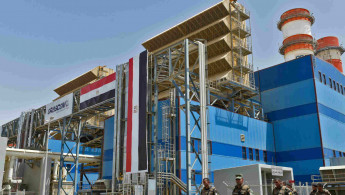Egypt electricity prices hiked as austerity continues to bite
Egypt's electricity minister announced a further price rise Tuesday, the latest in a series of controversial austerity measures by Cairo.
The latest price hike, which is due to come into effect in July, is tied to a $12 billion bail-out loan from the International Monetary Fund (IMF) that Cairo secured in 2016.
"The overall increases do not exceed 14.9 percent," Electricity Minister Mohammed Shaker said at a press conference.
Electricity prices were raised by an average of 26 percent last July and by 40 percent in July 2017.
The economy of the Arab world's most populous country has been hit by political instability and security threats since the 2011 uprising that ousted leader Hosni Mubarak.
Egypt enacted stringent austerity measures shortly after general-turned-president Abdel Fattah al-Sisi came to power in a coup in 2014. The measures have hit poor and middle-class Egyptians especially hard.
Living costs have soared, both due to subsidy cuts on essentials such as fuel and on the back of Egypt in 2016 devaluing its currency.
Unemployment has decreased slightly, but wages remain woefully low.
Despite a policy of austerity, Egypt's parliament approved a draft law last week to raise pensions for military personnel.
This is the tenth time Egyptian authorities have raised military pensions since Sisi took control after ousting the country's first democratically elected leader in 2013. In contrast, civil servants' pensions have only been raised five times.
Earlier this month, the IMF praised Cairo for "achieving macroeconomic stabilisation" and said it was on track to disburse the final $2 billion of the bailout loan.
In November 2016, Egypt reached an agreement with the IMF for a $12 billion loan package to be delivered in tranches.
In return, Egypt would have to implement certain conditions such as liberalising the exchange rate, gradually abolishing subsidies on basic commodities, and significantly reducing the number of those employed by the government in public administration
Agencies contributed to this report.
Follow us on Twitter: @The_NewArab





 Follow the Middle East's top stories in English at The New Arab on Google News
Follow the Middle East's top stories in English at The New Arab on Google News
![The UAE is widely suspected of arming the RSF militia [Getty]](/sites/default/files/styles/image_330x185/public/2024-11/GettyImages-472529908.jpg?h=69f2b9d0&itok=Yauw3YTG)
![Netanyahu furiously denounced the ICC [Getty]](/sites/default/files/styles/image_330x185/public/2024-11/GettyImages-2169352575.jpg?h=199d8c1f&itok=-vRiruf5)
![Both Hamas and the Palestinian Authority welcomed the ICC arrest warrants [Getty]](/sites/default/files/styles/image_330x185/public/2024-11/GettyImages-2178351173.jpg?h=199d8c1f&itok=TV858iVg)